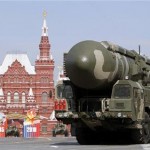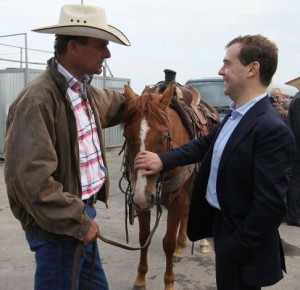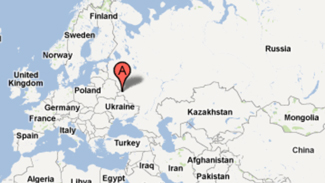News from Russia and New Zealand
Tuesday's World Events — Posted on May 29, 2012
RUSSIA – Medvedev chats with US cowboys working in Russia
MOSCOW | Russia’s prime minister paid a visit Wednesday to a farm that has imported cattle from the United States and also some American cowboys to help the Russians develop their struggling meat industry.
Dmitry Medvedev chatted with a couple of the cowboys, including one in a broad-brimmed black hat from the U.S. state of Idaho, who introduced the prime minister to his wife and young son.
Medvedev, the former president, asked the American in English whether he had managed to learn to speak any Russian.
The man, who was not identified in television reports on the visit, said that other than “please” and “thank you,” the most important words in his Russian vocabulary were those needed for taking care of the cattle: “open the gate” and “close the gate.”
The farm in the southwestern Bryansk region has more than 7,000 head of Aberdeen Angus cattle, many of them imported from the United States. At least four U.S. cowboys work on the farm, where they use American horses to herd the black cattle.
The Miratorg holding company, which operates the farm Medvedev visited and others in the Bryansk region, said it imported 5,500 head of the black cattle from the United States in January. Two previous shipments within the past year came from Australia.
The company also imported 57 American Quarter Horses, the breed used on ranches throughout the United States.
During a meeting at the farm with the Bryansk governor and other officials, Medvedev said Russia was committed to reducing its dependence on imported beef.
NEW ZEALAND – Government raises tobacco taxes sharply, aiming to become smoke-free country
WELLINGTON, New Zealand | New Zealand’s government Thursday announced a 40% increase in tobacco taxes over the next four years. Prices here are already among the highest in the world, and by 2016 they will top 20 New Zealand dollars ($15.05 U.S.) a pack on average.
Officials hope higher taxes and new restrictions will bring the country of 4.4 million closer to [eliminating smoking] entirely by 2025. Health officials here are so serious they recently considered hiking the cost of a pack of cigarettes to 100 New Zealand dollars. Although that idea was dismissed, another measure, which will force retailers to hide cigarettes below the counter rather than putting them on display, will come into effect in July.
Smoking rates among New Zealand adults have fallen from about 30% in 1986 to about 20% today. Cigarette sales have fallen more sharply, suggesting that even people who haven’t quit cut back as prices rose.
People who are still smoking aren’t happy about where prices are going. Chris Hobman said the cost is “horrendous” and could drive some low-income people to commit crimes to support their habit. He said the government needs to provide more support and alternatives to smokers if it’s serious about making them quit. …
The New Zealand branch of cigarette company British American Tobacco says the tax increases will force consumers to turn to the black market.
“Consumer demand is far better served by legitimate companies than by the illegal operators that will surely grow as the government makes it increasingly difficult for people to buy their product of choice,” wrote Susan Jones, head of corporate and regulatory affairs, in an email. So far, New Zealand officials have seen few cases of illegal tobacco sales.
The South Pacific nation’s smoking statistics are similar to those in other developed countries. According to a 2011 study by the World Health Organization, about 20% of adult New Zealanders smoke. That compares to about 16% of adults in the U.S., 17% in Australia, 23% in China and 27% in France.
New Zealand already charges more than 70% tax on cigarettes, compared to 41% on average for China, 45% on average for the U.S., 64% for Australia and 80% for France.

A mobile launcher with a Topol-M missile travels along the Red Square during a military parade in Moscow in this May 9, 2010 file photo. Reuters/Sergei Karpukhin
RUSSIA – Russia tests new missile, in warning over U.S. shield
MOSCOW | Russia tested a new long-range missile on Wednesday that should improve its ability to penetrate missile defense systems, the military said, in Moscow’s latest warning to Washington over deployment of a missile shield in Europe.
The Intercontinental Ballistic Missile (ICBM) was successfully launched from the Plesetsk facility in northwestern Russia and its dummy warhead landed on target on the Kamchatka peninsula on the Pacific coast, the Defense Ministry said.
The new missile is expected to improve Russia’s offensive arsenal, “including by increasing the capability to overcome missile defense systems that are being created,” the ministry said in a statement.
Russia opposes a missile shield the United States and NATO are deploying in Europe, saying it will be able to intercept Russian warheads by about 2018, weakening Moscow’s nuclear arsenal and upsetting the post-Cold War balance of power.
The United States says the system is intended to counter a potential threat from Iran and poses no risk to Russia, but the Kremlin has rejected those assurances and stepped up criticism of the system, to be deployed in four phases by about 2020.
(The news briefs above are from wire reports and staff reports posted at Boston.com on May 23, BrandonSun.com on May 24, and Reuters.com on May 23.)
Questions
1. For each of the 3 countries, give the following information:
a) location/the countries that share its borders
b) the religious breakdown of the population
c) the type of government
d) the chief of state (and head of government if different) [If monarch or dictator, since what date has he/she ruled? - include name of heir apparent for monarch]
e) the population
[Find the answers at the CIA World FactBook website. For each country, answers can be found under the "Geography" "People" and "Government" headings. Go to worldatlas.com for a list of continents.]
2. For RUSSIA (Medvedev visits cowboys):
a) list the who, what, where and when of the news item
b) Why have the Russians purchased Aberdeen Angus cattle from the U.S., and hired several American cowboys?
3. For NEW ZEALAND:
a) list the who, what, where and when of the news item
b) If the government believes that smoking is life-threatening, why do you think they don't just outlaw tobacco and cigarettes?
c) Should a government use taxes to encourage healthy or moral behavior? Explain your answer. (If so, who should decide which behaviors to tax?)
4. For RUSSIA (Russia tests missiles):
a) list the who, what, where and when of the news item
b) What is the purpose of Russia's new long-range missile test.
NOTE: "Answers by Email" has ended for the summer--daily news postings will end June 8th -- have a great summer!
Background
RUSSIA (CATTLE):
Angus cattle (Aberdeen Angus):
- Aberdeen Angus are a breed of cattle commonly used in beef production
- They were developed from cattle native to the counties of Aberdeenshire and Angus in Scotland, and are known as Aberdeen Angus in most parts of the world.
- They are naturally polled (do not have horns) and solid black or red, although the udder may be white.
- There have always been both red and black individuals in the population, and in the U.S. they are regarded as two separate breeds - Red Angus and Black Angus.
- Black Angus is the most popular beef breed of cattle in the United States, with 324,266 animals registered in 2005. (from wikipedia)
American Quarter Horse:
- The American Quarter Horse is an American breed of horse that excels at sprinting short distances.
- Its name came from its ability to outdistance other breeds of horses in races of a quarter mile or less; some individuals have been clocked at speeds up to 55 mph.
- The American Quarter Horse is well known both as a race horse and for its performance in rodeos, horse shows and as a working ranch horse.
- The compact body of the American Quarter Horse is well-suited to the intricate and speedy maneuvers required in reining, cutting, working cow horse, barrel racing, calf roping, and other western riding events, especially those involving live cattle.
- The American Quarter Horse is also shown in English disciplines, driving, and many other equestrian activities. (from wikipedia)
---------------------------
RUSSIA (MISSILE TEST) From the Reuters article:
Last autumn, then-President Dmitry Medvedev outlined steps Russia was taking to neutralize the perceived threat, including upgrades to Russia's offensive nuclear arsenal.
Russia and the United States are still in talks to agree cooperation on missile defense, but Moscow has warned of further measures if no such deal is reached and Washington refuses to provide binding guarantees its system will not threaten Russia.
At a conference in Moscow this month, senior General Nikolai Makarov said Russia could carry out pre-emptive strikes on future NATO missile defense installations to protect its security.
The European system is to include interceptor missile installations in Poland and Romania and a radar in Turkey as well as interceptors and radars on ships based in the Mediterranean Sea.
Russia usually names its weapons, but the Defense Ministry made no mention of a name for the new missile. It said it could be fired from a mobile launcher.
Missile defense has troubled ties between Russia and the United States since the Cold War.
The dispute over the current project has developed despite President Barack Obama's decision in 2009 to scrap the previous administration's plans for longer-range interceptors, which helped improve relations after a period of growing tension.
Western officials say improvements to Russia's ICBM arsenal undermine Moscow's argument that the system will present a threat and suggest the Kremlin wants to use the issue as a bargaining chip in broader talks on nuclear arms cuts.
During his 2000-2008 Kremlin term, President Vladimir Putin repeatedly said Russia would improve its offensive nuclear capability in response to U.S. missile defense plans.
In 2007, First Deputy Prime Minister Sergei Ivanov, now Putin's chief of staff, was quoted by Russian news agencies as saying Russia already had weapons that could overcome any current or future missile defense system.


